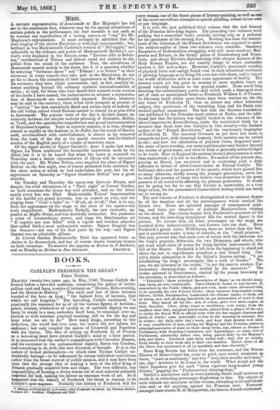Rink.
.A. SECOND representation of Semiramide at Her Majesty's has led me to the conclusion that, whatever may be the special attractions of
certain points in the performance, the tout ensemble is not such as to warrant any expectations of a lasting success or " run" for Mr. Mapleson's reproduction. It must certainly be admitted that the duet singing of the sisters Marchisio is well-nigh incomparable; but,
brilliant as was Mademoiselle Carlotta's version of " Bel raggio," and splendidly as the richness and power of Mademoiselle Barbara's con-
tralto were displayed in the famous scena " Eccome alfin in Babilo- nia," recollections of Titiens and Alboni could not entirely be dis- pelled from the minds of the audience. True, the attractions of Semiramide consist mainly in the duets, but it is a question whether by selecting "Serbarmi ognor " and " Ebbene ! a to ferisce " as their morceaux at every concert they take part in the Marchisios do not go far to lessen the attraction of their appearances at Her Majesty's. As actresses they have slight pretensions, and, in fact, scarcely at- tempt anything beyond the ordinary operatic conventionalities of action ; so that, for those who have heard their concert-room version of the duets I have named, the inducements to witness a representa- tion of Semiramide are considerably lessened. Besides, whatever may be said to the contrary, there is but little prospect at present of a " revival " for that excessively florid and ornate style of melody of the old Italian school which Rossini carried to almost its ne plus ultra in Semiramide. The popular taste of the day is divided almost ex- clusively between the simpler melodic phrasing of Donizetti, Bellini, or Verdi, and the spectacular magnificence and grand instrumentation
of Meyerbeer's operas. Taste in operatic matters, it is true, changes almost as rapidly as the fashions in Le Follet, but the music of Betnira- 'nide, overburdened with embellishment, is almost as far removed from the taste of the day as the quaint conceits and far-fetched similes of the English poets of a couple of centuries since. Of the signal merits of Signor Gassier's ilssur I spoke last week. Signor La Terza confirmed the favourable impression made by his
debut, but it is to be hoped that when the opera is repeated on Thursday next a better representative of Idreno will be entrusted with the part. Mr. Walter Bolton, who supplied the place of Signor Bettini on the first night, was of course protected from criticism by the short notice at which he had undertaken the part, but his re- appearance on Saturday as "Signor Gualtiero Bolton" was a great mistake.
On Tuesday and Thursday the opera was Lucrezia Borgia, and despite the rival attractions of a " Patti night" at Covent Garden, on both occasions the house was well attended, and on the latter nearly every box was filled. Mademoiselle Titiens' impersonation of the hateful yet grand Lucrezia, was as superb as ever, and her singing from " Com' e bello" to " M'odi, ah m'odi," that is to say,
from her appearance on the stage to the close of the opera—was truly magnificent. Mademoiselle Trebel, the new contralto, ap-
peared as Majeo Orsini, and was decidedly successful. She possesses a voice of extraordinary power, and sings the Bacchanalian air " Il segreto per esse felice" with a vigour and reckless abandon that called forth a most enthusiastic encore. Signor Giuglini was the Gennaro—not one of his best parts by the way—and Signor Gassier was an admirable .4fonso. At Covent Garden Mademoiselle Patti has appeared twice as Amines in La Sonnambula, and has of course drawn immense houses on both occasions. To-morrow she appears as Rosina in Il Barbiere,
and on Monday as Zerlina in Don Giovanni. AMATEUR.






























 Previous page
Previous page